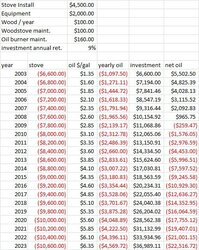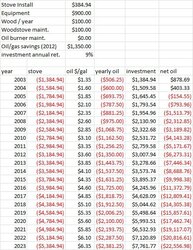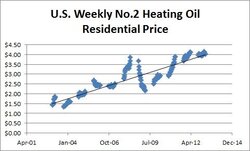So, I've been thinking about how "frugal" heating with wood really is. I mean, are we really saving money? I wanted to run some cost analysis, for various scenarios, from the guy who buys an expensive stove and all of his wood, to the DIY'er with an Englander. I think the data is interesting.
For the case of the oil burner, I assumed $160/year maintenance (what I pay for my service contract), and used numbers for the cost of heating with oil, published by the U.S. Energy Information Administration (EIA). The first is a statement released recently that the average homeowner heating with oil in the northeast spent $2087 on heating oil last year. I also used the EIA for my calculation of historic (and predicted) oil prices, which has them increasing $0.25 annually, with an intercept of -$24.40 in 1900.
The oil burner then takes the money they were going to put toward getting started in wood, and invests it. I compared the growth of this modest investment, minus the cost of buying oil and maintaining the oil burner each year, to the costs of starting up and maintaining wood burning. The investment growth rate came from my own 401k statement, in which my rather conservative investments had 10-year averaged annual returns between 5% and 13%, with a net yearly return of approximately 9% averaged over the last 10 years.
First, the case of the DIY'er, who may spend $1500 for a low-budget stove, build his own hearth, and install his own chimney. I put $500 in equipment, because even if he already owns a chainsaw, this is the guy who will surely be shopping for a better one, after getting into this hobby. Equipment can also include, PPE, hearth tools, whatever. I put only $150 for wood costs, as this guy scrounges his own, and is only paying fuels, fluids, chains, and depreciation on his equipment. I assumed this guy has only $50/year maintenance, whether it be gaskets, catalyst replacements, whatever. I also set this guy's oil burner maintenance real low, as he's not the type to have a service contract with the oil company, anyway.
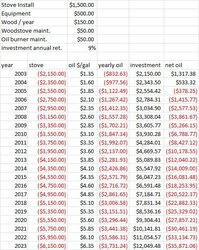
So, this guy has spent about $6k on heating with wood, over a 20 year period. The guy who just kept his oil burner, and invested that wood stove start-up money has seen his investment grow to $12k, but with $3k'ish yearly oil bills, he's $36k in the hole. Heating with wood has saved this guy $30k over 20 years.
Scenario 2 is the polar opposite. This guy bought a new BK or Woodstock, had it professionally installed with a new hearth and chimney, and buys all of his wood. He also has a chimney sweep come out to service his stove and chimney each year. He does not need much equipment, other than a real expensive set of hearth tools, and a cheap Poulan from Lowes Depot. If he still used his oil burner, he would've had a maintenance contract on it, so that's figured in.
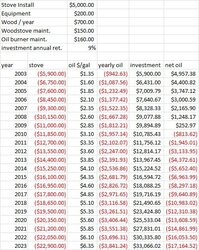
So, this guys investment has grown very nicely, because it was much larger to begin with. He's spent $23k on heating with wood (ouch!), while investing that money and spending the same $3k'ish/year on oil, he'd have been in the hole only $17k. Heating with oil would have been cheaper, for this guy.
The third guy is me. I inherited one stove with the house, and bought a second used. I had two chimneys relined at a net cost of $3k. I use MUCH more than average oil (previous owners paid $7k in 2011, but I had it down to $5k yearly average, on last calculation) to heat this joint, but I collect all of my own wood. I bought three new saws, cant hook, and some other fun stuff, but also sold two good saws, when figuring my equipment cost. I buy catalysts, and do have a pro check my chimneys from time to time, and figure my maintenance to average $100/year. I had a contract with my oil burner co. at $160/year. The 401k is a little irrelevant (I'm already putting away the maximum allowed by law), but I'm assuming I'd find some other place to stick that start-up money at similar rates, taxes ignored.
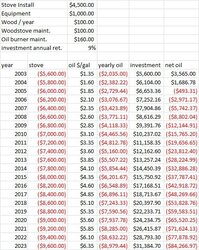
So, I'll spend just shy of $10k to heat this place with oil for 20 years. In the same time, that start-up money would grow to $31k, but I'd be $84k in the hole after subtracting out what I'd have spent on oil. Not bad!
I'm sure no one will be shy at poking holes in my analysis. Let me know if you want me to run your numbers.
For the case of the oil burner, I assumed $160/year maintenance (what I pay for my service contract), and used numbers for the cost of heating with oil, published by the U.S. Energy Information Administration (EIA). The first is a statement released recently that the average homeowner heating with oil in the northeast spent $2087 on heating oil last year. I also used the EIA for my calculation of historic (and predicted) oil prices, which has them increasing $0.25 annually, with an intercept of -$24.40 in 1900.
The oil burner then takes the money they were going to put toward getting started in wood, and invests it. I compared the growth of this modest investment, minus the cost of buying oil and maintaining the oil burner each year, to the costs of starting up and maintaining wood burning. The investment growth rate came from my own 401k statement, in which my rather conservative investments had 10-year averaged annual returns between 5% and 13%, with a net yearly return of approximately 9% averaged over the last 10 years.
First, the case of the DIY'er, who may spend $1500 for a low-budget stove, build his own hearth, and install his own chimney. I put $500 in equipment, because even if he already owns a chainsaw, this is the guy who will surely be shopping for a better one, after getting into this hobby. Equipment can also include, PPE, hearth tools, whatever. I put only $150 for wood costs, as this guy scrounges his own, and is only paying fuels, fluids, chains, and depreciation on his equipment. I assumed this guy has only $50/year maintenance, whether it be gaskets, catalyst replacements, whatever. I also set this guy's oil burner maintenance real low, as he's not the type to have a service contract with the oil company, anyway.

So, this guy has spent about $6k on heating with wood, over a 20 year period. The guy who just kept his oil burner, and invested that wood stove start-up money has seen his investment grow to $12k, but with $3k'ish yearly oil bills, he's $36k in the hole. Heating with wood has saved this guy $30k over 20 years.
Scenario 2 is the polar opposite. This guy bought a new BK or Woodstock, had it professionally installed with a new hearth and chimney, and buys all of his wood. He also has a chimney sweep come out to service his stove and chimney each year. He does not need much equipment, other than a real expensive set of hearth tools, and a cheap Poulan from Lowes Depot. If he still used his oil burner, he would've had a maintenance contract on it, so that's figured in.

So, this guys investment has grown very nicely, because it was much larger to begin with. He's spent $23k on heating with wood (ouch!), while investing that money and spending the same $3k'ish/year on oil, he'd have been in the hole only $17k. Heating with oil would have been cheaper, for this guy.
The third guy is me. I inherited one stove with the house, and bought a second used. I had two chimneys relined at a net cost of $3k. I use MUCH more than average oil (previous owners paid $7k in 2011, but I had it down to $5k yearly average, on last calculation) to heat this joint, but I collect all of my own wood. I bought three new saws, cant hook, and some other fun stuff, but also sold two good saws, when figuring my equipment cost. I buy catalysts, and do have a pro check my chimneys from time to time, and figure my maintenance to average $100/year. I had a contract with my oil burner co. at $160/year. The 401k is a little irrelevant (I'm already putting away the maximum allowed by law), but I'm assuming I'd find some other place to stick that start-up money at similar rates, taxes ignored.

So, I'll spend just shy of $10k to heat this place with oil for 20 years. In the same time, that start-up money would grow to $31k, but I'd be $84k in the hole after subtracting out what I'd have spent on oil. Not bad!
I'm sure no one will be shy at poking holes in my analysis. Let me know if you want me to run your numbers.


